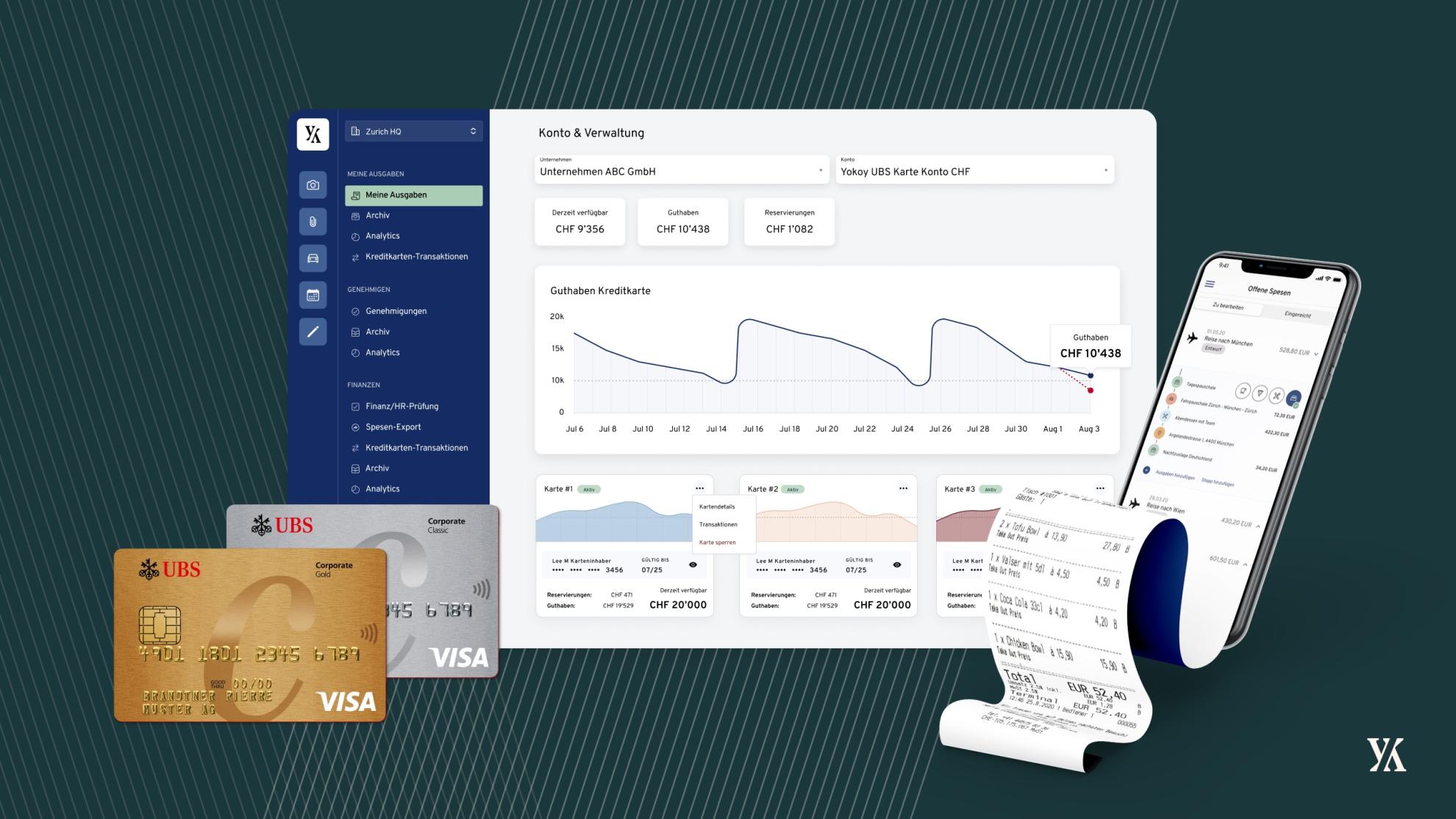Spend management reinvented

Yokoy is one of Switzerland's hottest scale-ups in 2022, with breathtaking growth from 0 to 250 employees in just three years. swiss.tech wanted to know what lies behind this success story and spoke with CEO and co-founder Philippe Sahli.
Have you ever wondered why you still have to compile your expenses manually each month and – if you're lucky – send them to your superior in an approval system, wasting precious time? At a time when driverless cars, automated drones and intelligent algorithms predicting which films we'll like have long since become reality? Here's the good news: you could soon be saying goodbye to manual spend management.
500 customers and over USD 100 million of fresh capital in three years
Yokoy, winner of the TOP 100 Swiss Startup Award 2022, is on course to make the business world a bit better. The Swiss scale-up, founded in 2019 in Zurich by Philippe Sahli and four co-founders, automates business spend management through artificial intelligence (AI) and provides actionable insights by combining expense management, invoice processing, and the administration of intelligent corporate cards on a single platform. Built as a software-as-a-service platform, the company can already boast over 500 customers in more than 60 countries after only three years.

Yokoy's combines automated expense management, credit cards and supplier invoices on a single platform.
swiss.tech wanted to know from CEO and co-founder Philippe Sahli how it was possible for Yokoy to grow so quickly, what his work as CEO of a global company looks like and why Switzerland has a lot of advantages over international competitors. The Yokoy team has been doing a lot of things right, not the least of which was its successful closure of an USD 80 million Series B round led by Sequoia Capital this past March.
You started your career as a chemical laboratory technician. Could you have imagined that you would one day be the CEO and co-founder of a company worth more than USD 500 million?
Indeed, I started with an apprenticeship as a chemical laboratory technician at Novartis in Basel, before studying finance and accounting in New York and London, and then working as a management consultant at Ernst & Young (EY) in Zurich. This might seem like a radical change but it isn't really: both disciplines – chemistry and finance – are highly number-driven. That being said, I've always had an entrepreneurial mindset, the urge to start a company myself and solve a global problem.
How did you and your co-founders come up with the idea of Yokoy?
Before founding Yokoy, my co-founders and I experienced how cumbersome it was to manually prepare, monitor, check, approve and process expenses, some as employees and others as CFOs of international companies. That's why we set out to start a revolution in spend management. Our goal was clear: to fully automate the entire process of expenses, card transactions and supplier invoices using artificial intelligence (AI). We were looking to design a platform that would automate at least 80% of recurring actions while using an AI algorithm to flag the remaining, exceptional 20% for manual checking, such as significant overspending on a business trip or sudden fee hikes by a new supplier during an otherwise normal month. We wanted to make sure that worldwide, nobody in any organisation would have to manually process something like a three-euro coffee shop receipt anymore.
What has the biggest challenge been so far on your journey?
The biggest, but also best challenge is certainly my new role as the CEO of a global software company. In this role, all parts of a business come together. Internally, this means aligning with the different departments, such as Technology, Research, Marketing, Sales, Operations, Legal, Finance and many more. And externally it is all about connecting and engaging with our customers, partners, new prospects, and investors. It is a truly vibrant position with a broad range of topics. But numbers are key as well – and that's where my experience in chemistry and finance is truly helpful. I have structured Yokoy as a fully data-driven company with my own business intelligence team. This enables company-wide data availability to get insights for making informed business decisions quickly. I truly love the job – but mostly because of the team around me, who helps me push Yokoy to become the global leader in spend management and accounts payable automation for mid- and large-sized companies.
When a company is small, it's possible to oversee the most crucial parts of the business. But Yokoy now has over 250 employees and several global offices, doesn't it? Oversight must be more difficult nowadays. What is your current role here as CEO and co-founder?
In the early days of Yokoy, my role was mostly about hiring the best people and helping out wherever I was needed. Now, with more than 250 people, it's all about communication and alignment. In order for the entire team to run in the same direction and have a clear vision of where Yokoy is headed, I spend most of my time talking to our employees, customers, and partners, making sure that we stay agile and focused to bring value to our customers.
Founded only in 2019, you are still considered very young. But at the same time, you have been growing tremendously and have closed a Series B round worth USD 80 million. You were also picked as the best Swiss start-up in 2022. Was this growth planned?
Planning growth is complex, especially in the early days. I believe the best way is to solve a real issue together with customers and partners. This will automatically fuel growth. In the end, it's always the customers who decide which product or solution will fly and which won't. The reason why we were able to grow within 3 years to over 500 customers globally is on the one hand the strong customer demand for automation and cost insights in finance, and on the other having the best possible team of engineers, project leaders, managers, support personnel, AI experts, etc. who worked tirelessly on making Yokoy an international brand in finance automation.
How difficult was it for you and your team to raise money for your idea when you were just starting out?
Raising money with 'just an idea' is extremely difficult, especially in Europe, where most venture capital firms are not keen on taking as much risk as in other parts of the world like Silicon Valley. So, we decided to put together a strong team and acquire the first happy customers, before we went out fundraising. This helped a lot, as we could show that we'd found a real gap in the market and come up with a solution for it.
Is Switzerland a good place for a start-up aiming at the global market?
Switzerland, especially Zurich, is the home to many international companies that have the need to automate their processes in spend management. In addition, our network was already very strong, which means we were able to engage with and gain insights from important partners from early on. Due to the relatively small Swiss market size, we focused on expanding to new countries rather soon. While this might be challenging in the beginning, it certainly is a big advantage for all other expansions to come thanks to all the expansion experience gained along the way.
What is the advantage of having your head office in Switzerland as opposed to other global FinTech hubs?
Switzerland has an excellent education system (with good universities) and high living standards. This allows us to scout out top talent (e.g. from ETH Zurich and the University of St.Gallen) and even get people (mostly senior leadership) from abroad to relocate to Switzerland. They love it here. What's more, Zurich is well connected to all major cities in Europe and abroad. As our roots are in Switzerland, our network is established here, which makes it easier to start a company and find the first customers and partners.
Let's conclude our interview with a personal question: what will you be doing ten years from now?
Changing the world for the better – in one way or another.




